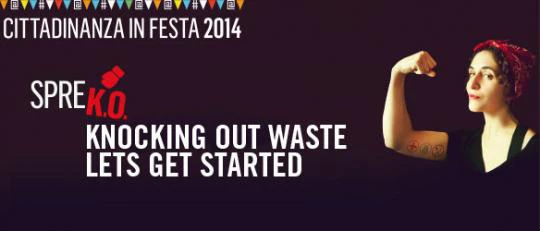Every day, the world’s population generates enough waste to fill about 14 large soccer stadiums from top to bottom, more than 3.5 million tonnes. That's a lot of trash, from plastic bottles that aren't going anywhere to food scraps and other perishable items decaying and building up greenhouse gases in landfills and trash dumps.
A couple of weeks ago, the Connect4Climate team supported the Italian nonprofit Cittadinanzattiva at a three-day festival called SpreK.O. – Cittadinanza in Festa 2014 to promote sustainability and bring attention to our world's growing waste challenge. (Cittadinanzattiva means Active Citizenship and has 115,000 members.)
We started early with a live web discussion on waste management issues on the Guardian’s Global Development Professionals Network with a distinguished panel of 10 experts. John Morton, senior urban environment specialist at the World Bank, recognized the importance of bringing value to recyclables to motivate people to manage and improve their recycling activities.
David Jones from the Plastic Oceans Foundation added two great examples: “In Dahab in the Sinai, no tin is on the ground because the locals understand their value and recycle them. In Germany, every PET bottle is worth 40 cents for recycling.” He raised the point that plastic production accounts for 88 percent of the world’s oil reserves, and about 150 million tonnes of plastic waste is thrown away annually after using it just once. Improper waste management in India has resulted in nationwide public protests from the northernmost Jammu and Kashmir to the southernmost Tamil Nadu, according to Ranjith Annepu.
Highlights from that online discussion, summarized as 12 ways to tackle waste, helped fuel the panel discussions at Cittadinanza in Festa in Italy. The festival’s core theme, “knocking out waste,” was used as a thread to explore a variety of sustainability challenges faced by Italian and global citizens, from an economic, environmental and social perspective.
The panelists discussed how Italians throw away 76 kg of edible food per year on average, 42 percent at home. Italian Minister of Health, Beatrice Lorenzin, underlined the importance of finding ways of reusing food that is still healthy but no longer meets retail standards for restaurants and other businesses.
Michele Bruni of Enterprise Projects Ventures emphasized the need for technological innovation to overcome the shrinking agricultural land that can no longer keep up with urbanization and population trends. Food production is being heavily constrained by rapid urbanization. Over the past three years, 720 km² of Italian land has been paved over by cement, equivalent to the surface area of Milan, Bologna, Florence, Naples and Palermo combined. The social costs of the carbon dioxide emissions generated during this construction activity have been estimated at 130 million Euros. It was also estimated to have cost the Italian economy 90 million Euros due to having to import food that could not be grown locally.
If waste trends continue, Walid Norris from Connect4Climate noted, landfilled food waste is predicted to increase world methane emissions from 31 million to 43 million tonnes, a significant jump for one of the more powerful climate change-inducing greenhouse gases.
Specific solutions discussed included innovation in consumer products, with companies like Fater achieving zero waste in their production process and designing fully recyclable products. Similarly, Giorgio Arienti highlighted that citizens can now take simple steps to recycle almost every electronic product they buy.
We also honored the singer Rokia Traoré at the event as a Connect4Climate Global Leader for her commitment and dedication to supporting climate action around the world, and she performed selections from her newest album, “Beautiful Africa.” Documentaries from our Action4Climate youth competition were selected for the festival. One of those documentaries, Zbélé, tells the story of creative waste management solutions in Lebanon, and another, Vintage Bazaar, shows that trendy and fashionable things can be created from old furniture.
The event was an encouraging example of citizens coming together to take ownership of an environmental and climate challenge and presenting solutions and best practices for addressing waste issues locally and around the world. It's the sort of civic responsibility we need more of.



Join the Conversation